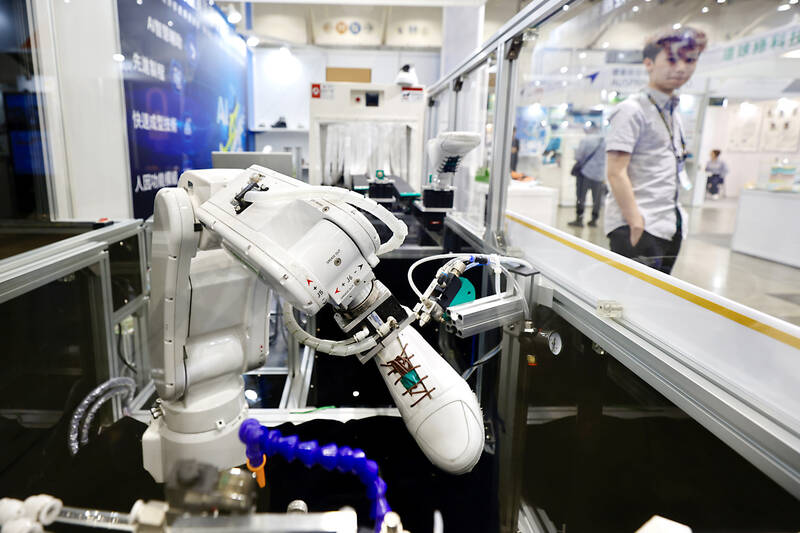Machinery exports last month fell 1.4 percent year-on-year, a reversal of the previous month’s 2.1 percent growth, the Taiwan Association of Machinery Industry (台灣機械公會) said in a report yesterday.
Machinery exports totaled US$2.45 billion last month, compared with US$2.49 billion a year earlier, data compiled by the association showed.
On a monthly basis, machinery exports increased 2.6 percent from US$2.39 billion, the data showed.

Photo: Ritchie B. Tongo, EPA-EFE
In the first 11 months of this year, machinery exports totaled US$26.66 billion, down 0.6 percent from US$26.86 billion in the same period last year, the association said.
Local machinery makers would see a gradual recovery in orders with room for improvement in the US market in particular, it said.
The association based its optimism on the latest export order statistics unveiled by the Ministry of Economic Affairs on Nov. 20, which showed that orders for machinery products and mechanical equipment had risen annually for four consecutive months through October.
However, as US president-elect Donald Trump has proposed tariff policies that he said would help shift manufacturing to the US, Taiwanese exporters must make early preparations to mitigate risk, even though the scope of the tariff impact needs to be monitored closely, it said.
Moreover, the unfavorable foreign exchange rates, such as the recent plunges in the yen and won, would weigh on local manufacturers in receiving orders, it added.
The US and China remained the two largest buyers of Taiwanese machinery goods during the 11-month period, at US$6.58 billion and US$6.21 billion respectively, followed by Japan, with purchases totaling US$1.96 billion, the data showed.
Purchases from the US, China and Japan accounted for 24.7 percent, 23.3 percent and 7.4 percent respectively of Taiwan’s machinery exports in the first 11 months, the data showed.
By product, inspection and testing equipment, electronic equipment and machine tools were the local industry’s top three machinery products from January to last month.
The report showed that overseas shipments of electronic equipment increased 3.4 percent year-on-year to US$4.54 billion and those of inspection and testing equipment rose 4 percent to US$4.34 billion, while outbound shipments of machine tools fell 16.2 percent to US$2 billion during the first 11 months.
Machine tool manufacturers are expected to regain momentum next year, as the segment has always been slower than other segments in the machinery industry in terms of business recovery, the association said, adding that it is also because the US market is expected to gradually heat up under Trump’s trade and industry policies.
The association said it maintains a cautiously optimistic view of this segment, as Taiwan’s machine tool exports to the US had shown positive growth for two consecutive months through last month.

With an approval rating of just two percent, Peruvian President Dina Boluarte might be the world’s most unpopular leader, according to pollsters. Protests greeted her rise to power 29 months ago, and have marked her entire term — joined by assorted scandals, investigations, controversies and a surge in gang violence. The 63-year-old is the target of a dozen probes, including for her alleged failure to declare gifts of luxury jewels and watches, a scandal inevitably dubbed “Rolexgate.” She is also under the microscope for a two-week undeclared absence for nose surgery — which she insists was medical, not cosmetic — and is

CAUTIOUS RECOVERY: While the manufacturing sector returned to growth amid the US-China trade truce, firms remain wary as uncertainty clouds the outlook, the CIER said The local manufacturing sector returned to expansion last month, as the official purchasing managers’ index (PMI) rose 2.1 points to 51.0, driven by a temporary easing in US-China trade tensions, the Chung-Hua Institution for Economic Research (CIER, 中華經濟研究院) said yesterday. The PMI gauges the health of the manufacturing industry, with readings above 50 indicating expansion and those below 50 signaling contraction. “Firms are not as pessimistic as they were in April, but they remain far from optimistic,” CIER president Lien Hsien-ming (連賢明) said at a news conference. The full impact of US tariff decisions is unlikely to become clear until later this month

GROWING CONCERN: Some senior Trump administration officials opposed the UAE expansion over fears that another TSMC project could jeopardize its US investment Taiwan Semiconductor Manufacturing Co (TSMC, 台積電) is evaluating building an advanced production facility in the United Arab Emirates (UAE) and has discussed the possibility with officials in US President Donald Trump’s administration, people familiar with the matter said, in a potentially major bet on the Middle East that would only come to fruition with Washington’s approval. The company has had multiple meetings in the past few months with US Special Envoy to the Middle East Steve Witkoff and officials from MGX, an influential investment vehicle overseen by the UAE president’s brother, the people said. The conversations are a continuation of talks that

CHIP DUTIES: TSMC said it voiced its concerns to Washington about tariffs, telling the US commerce department that it wants ‘fair treatment’ to protect its competitiveness Taiwan Semiconductor Manufacturing Co (TSMC, 台積電) yesterday reiterated robust business prospects for this year as strong artificial intelligence (AI) chip demand from Nvidia Corp and other customers would absorb the impacts of US tariffs. “The impact of tariffs would be indirect, as the custom tax is the importers’ responsibility, not the exporters,” TSMC chairman and chief executive officer C.C. Wei (魏哲家) said at the chipmaker’s annual shareholders’ meeting in Hsinchu City. TSMC’s business could be affected if people become reluctant to buy electronics due to inflated prices, Wei said. In addition, the chipmaker has voiced its concern to the US Department of Commerce